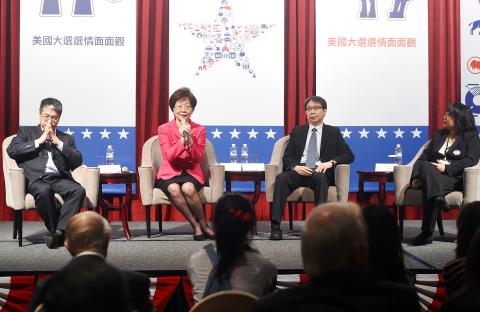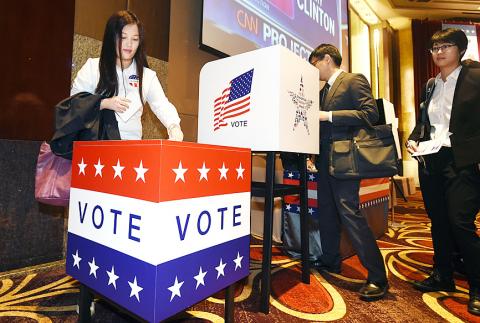US president-elect Donald Trump’s upset win drew mixed reactions from academics and non-governmental organization (NGO) leaders yesterday, from speculation about new arms sales to Taiwan to concern over Taipei’s quest to join the US-led Trans-Pacific Partnership (TPP).
A crowd of several hundred reporters, academics and NGO officials gathered for a US presidential election watch event organized by the American Institute in Taiwan (AIT) and Taiwan Democracy Foundation in Taipei, milling through a Shangri-La Far Eastern Hotel ballroom while watching broadcasts of the election.
As servers bedecked in US flag-themed costumes served refreshments, the tension in the room rose as a tight race became apparent.

Photo: Liao Chen-huei, Taipei Times
While a mock poll of participants conducted by the AIT showed a small majority would have voted for Democratic US presidential candidate Hillary Rodham Clinton, participants gave widely varying responses when asked about their perception of the consequences of the election results for Taiwan.
“In Taiwan, political hands in both parties are very familiar with Clinton’s aides, so if she were elected, they would feel more at ease,” Tamkang University professor Alexander Huang (黃介正) said. “If Donald Trump was elected, there is going to be a lot of homework not only for us, but for the whole region, and there is a lot that is hard to predict.”
Lai I-chung (賴怡忠), an executive committee member of the pan-green Taiwan Thinktank, said Taiwan-US relations would remain stable, with the possibility of some new arms sales because of Trump’s emphasis on allies’ self-defense.

Photo: Liao Chen-huei, Taipei Times
“The US’ foreign policy is not just the product of whatever the president says,” Lai said. “While it is still unclear what the content of Trump’s foreign policy will be, we will still have a strong Republican congress, as well as the Taiwan Relations Act and the ‘six assurances,’ so the basic structure of Taiwan-US relations should not change much even if Trump has some new ideas.”
“Trump has certainly made statements about East Asia that are different from traditional US policy, whether stating that South Korea and Japan could consider developing nuclear weapons or calling for East Asian countries to bear a greater part of the burden of defending themselves. However, while Japan and South Korea are definitely going to be nervous, there is also an increased possibility of further arms sales to Taiwan, with fewer of the restrictions that have been imposed in the past,” he said.
“There may be more pressure to purchase US arms, but they will not necessarily be useful weapons,” National Sun Yat-sen University political science professor Liao Da-chi (廖達琪) said, adding that Trump would likely be driven mainly by the desire to profit US firms.
The professor called for a full reconsideration of Taiwan’s policy toward the Asia-Pacific region in the face of new uncertainty about US foreign policy.
“Because Trump is a businessman without any background in politics, it is extremely hard to predict what he will do with regard to Taiwan, but he appears inclined to reduce the US’ involvement in foreign affairs,” she said. “While the Taiwan Relations Act will remain in place, presidents have substantial discretion over the extent to which they implement it.”
Other participants urged caution in predicting a potential impact, citing the geopolitical factors underpinning US foreign policy.
“We should be careful not to immediately label Trump as rash,” National Chung Hsing University Graduate Institute of International Politics professor Tsai Ming-yeng (蔡明彥) said, adding that who Trump names to his national security team would be a crucial signal of future policy direction.
“The overall alignment from the past several decades should not change, because it is the product of geopolitics, which is not something any one person can change, regardless of who is elected,” said Chang Tieh-chih (張鐵志), cofounder of the Chinese-language online publication The Reporter, while adding that the future of the TPP was uncertain because of Trump’s opposition to the deal.
“Trump said just a few days ago that Taiwan and Mexico were stealing US jobs. I am not clear why he singled us out, but the sense one gets is that all non-Americans are a drag on US economic development,” said Clarence Chou (周宇修), a director of the Campaign for Media Reform.

SECURITY: As China is ‘reshaping’ Hong Kong’s population, Taiwan must raise the eligibility threshold for applications from Hong Kongers, Chiu Chui-cheng said When Hong Kong and Macau citizens apply for residency in Taiwan, it would be under a new category that includes a “national security observation period,” Mainland Affairs Council (MAC) Minister Chiu Chui-cheng (邱垂正) said yesterday. President William Lai (賴清德) on March 13 announced 17 strategies to counter China’s aggression toward Taiwan, including incorporating national security considerations into the review process for residency applications from Hong Kong and Macau citizens. The situation in Hong Kong is constantly changing, Chiu said to media yesterday on the sidelines of the Taipei Technology Run hosted by the Taipei Neihu Technology Park Development Association. With

CARROT AND STICK: While unrelenting in its military threats, China attracted nearly 40,000 Taiwanese to over 400 business events last year Nearly 40,000 Taiwanese last year joined industry events in China, such as conferences and trade fairs, supported by the Chinese government, a study showed yesterday, as Beijing ramps up a charm offensive toward Taipei alongside military pressure. China has long taken a carrot-and-stick approach to Taiwan, threatening it with the prospect of military action while reaching out to those it believes are amenable to Beijing’s point of view. Taiwanese security officials are wary of what they see as Beijing’s influence campaigns to sway public opinion after Taipei and Beijing gradually resumed travel links halted by the COVID-19 pandemic, but the scale of

TRADE: A mandatory declaration of origin for manufactured goods bound for the US is to take effect on May 7 to block China from exploiting Taiwan’s trade channels All products manufactured in Taiwan and exported to the US must include a signed declaration of origin starting on May 7, the Bureau of Foreign Trade announced yesterday. US President Donald Trump on April 2 imposed a 32 percent tariff on imports from Taiwan, but one week later announced a 90-day pause on its implementation. However, a universal 10 percent tariff was immediately applied to most imports from around the world. On April 12, the Trump administration further exempted computers, smartphones and semiconductors from the new tariffs. In response, President William Lai’s (賴清德) administration has introduced a series of countermeasures to support affected

Pope Francis is be laid to rest on Saturday after lying in state for three days in St Peter’s Basilica, where the faithful are expected to flock to pay their respects to history’s first Latin American pontiff. The cardinals met yesterday in the Vatican’s synod hall to chart the next steps before a conclave begins to choose Francis’ successor, as condolences poured in from around the world. According to current norms, the conclave must begin between May 5 and 10. The cardinals set the funeral for Saturday at 10am in St Peter’s Square, to be celebrated by the dean of the College